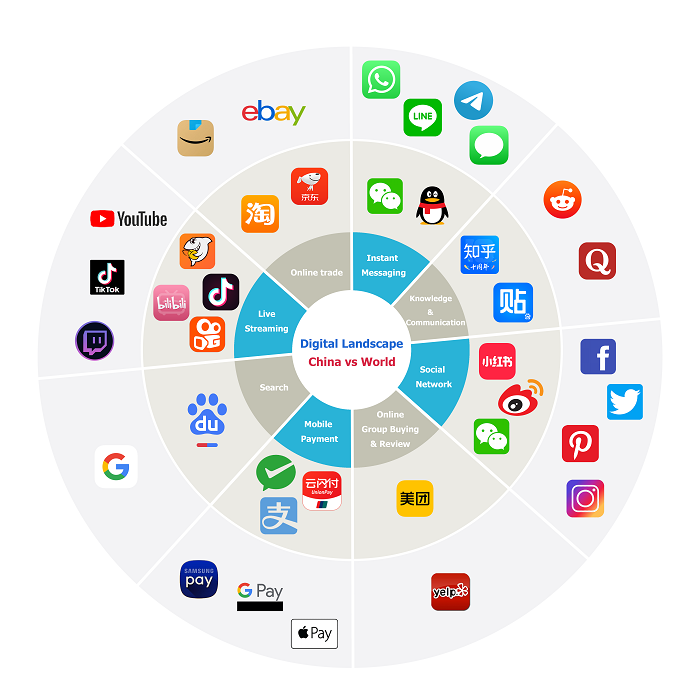Having a dedicated business website is essential in today’s environment, and is especially important if your business has a global presence. Hosting your website should not be a problem, but in China, things are different. You do not have Google support because Chinese regulations block websites like Google, YouTube, Facebook, and other major websites. The Great Firewall of China (GFoC) is an apt name to describe the Chinese government’s proactive approach to regulating external influences over its cyberspace. Does it mean that foreign websites are not allowed in China? No, not at all. Chinese regulations allow foreign websites to operate in China, provided they do not violate the interests of its netizens. However, as China slows or blocks web traffic that does not comply with its regulations, foreign business entities should be careful when creating a Chinese web presence. Additionally, foreign business should check out the dos and don’ts of software development in China to work around the local norms and regulations to make their apps/websites accessible to Chinese netizens.
The items to check on your ‘China web presence checklist’
The Chinese web market is different from other global markets. Hence, all business brands should modify their approach when establishing their Chinese web presence and seek expert advice with professionals who have experience setting up and supporting businesses in the region.
1. Website loading time optimization
Loading time is a significant issue for foreign websites hosted outside China. Hosting a website in China is not possible without obtaining a local business registration. If your business is registered in China, you can apply for an ICP license issued by the Ministry of Industry and Information Technology. Alternatively, you can consider hosting in nearby regions like Taiwan if you would like to host offshore instead of hosting on Chinese mainland servers. Hosting with a company having a data center in Taiwan can improve web loading speed significantly.
2. Get a .CN domain
Foreign businesses are now eligible to have .CN domains today, and acquiring one should be your top priority. Compared to .COM or .NET domains, Baidu prefers .CN domains and ranks them higher on their search engine results. It is advisable to register your .CN domain at the earliest possible time, or you might have to deal with Chinese Internet squatters if your brand gains adequate recognition. Also, you should not use subdomains or multiple domains. As you do not have access to Google in China, you have to depend on Baidu. Baidu dislikes subdomains, as it prefers to have different languages on separate domains. Therefore, you should not have an en.mysite.com for English and zh.mysite.cn for Chinese. A better alternative is to have a mysite.com as your main site and mysite.cn as your Chinese language equivalent. If you want to rank high on Baidu, avoid subdomains. There are certain reasons to keep a .CN domain and you can find detailed information about it here.
3. Stay away from blocked social media links
Landing pages for websites always have social media links. Generally, Facebook, Twitter, Instagram, and YouTube are the favored links. However, these links do not work in China because the GFoC makes them inaccessible. Therefore, you should ensure not to have broken links that could significantly slow down website loading times. The ideal loading time should not exceed five seconds. Goclick China can help you with this. Another option is to integrate the share and like buttons to Chinese social media channels. When in China, you should have a Chinese social media presence on sites like WeChat, YouKu, or Weibo. WeChat does not have a link, but your Chinese website should display the official account’s QR code. The Chinese audience prefers to visit local social media, and linking to such accounts can help establish your Chinese web presence.

4. Using JavaScript is not advisable
Baidu cannot crawl Flash and iFrames content. Besides, it is not very comfortable with JavaScript either. Therefore, your SEO content, including the dropdown box menus, should not be in JavaScript. It is a better option to have a non-JS-based duplicate footer menu. As for Flash and iFrames, no one uses them today.
5. Using a robot.txt file is not advisable
While Google prefers websites using robot.txt files to communicate with search engine crawlers, Baidu does not favor its use. For your Chinese website, you should ensure setting specific instructions in the .htaccess file or your server settings. In addition, having a separate domain for your Chinese web presence enables you to avoid using the robot.txt file.
6. Host your website on a Chinese web server
Hosting your website on a Chinese web server is a sure recipe for success in China. First, you have to apply for an ICP license from the respective ministry. Alternatively, you can host it on a server in nearby locations like Taiwan, Hong Kong or Singapore region. Localizing your website is a sure way to comply with GFoC regulations. It ensures that your website does not get blocked, thereby restricting your access to the Chinese market.
7. Localization can clinch the deal
Offering chat services in Mandarin can get your business to the next level. However, localization does not mean translating your entire content into Chinese. Therefore, as a business venturing into the Chinese Internet scene, you should ensure the following:
- A Chinese-specific website is preferable
Chinese prefer to communicate in local Mandarin rather than English. Hence, businesses should invest in a specific Chinese website instead of translating the website content into Chinese using translation tools. Furthermore, avoiding subdomains ensures that your website ranks high on Baidu. - Offering Chinese payment options
Chinese consumers trust local Chinese payment apps like WeChat Pay, AliPay, and Union Pay. Therefore, eCommerce businesses offering services in China are better off offering Chinese payment options to ensure greater patronage. China has a unique eCommerce and mobile payment ecosystem supported by Alipay, WeChat Pay, etc., that is easy to use and is driving digital transformation across China. Mobile payment solutions like Alipay, WeChat Pay, etc., allow people to perform easy transactions and facilitate a rapid movement of funds between bank accounts. - Native translation for a Chinese website
Some foreign businesses cut corners by not using native translators for their Chinese websites. Instead, you should use professional translators to present the content in Chinese and have it proofread by native Mandarin speakers. Secondly, your website should offer live support in Mandarin. Chinese online customers feel comfortable speaking in their native language rather than in English. Having chat options that monitor the conversation and capture users’ data simultaneously is preferable.

Satisfy GFoC regulations and ensure against website blockage
The Internet offers an excellent medium for sharing information, and the Chinese government recognizes the influencing power of the Internet. Hence, it has certain restrictions by formulating a regulatory framework, and technical mechanism named the Great Firewall of China. The Chinese regulatory authorities are strict when dealing with inappropriate content spread on the Internet. The only way to build up an effective Chinese presence is to satisfy China's internet censorship regulations. Here are some tips that could help you establish a robust Chinese presence for your business:
- Be careful with keywords – The GFoC blocks content that includes unacceptable keywords. Hence, businesses should ensure the web content and blogs remain free of sensitive content that could be termed offensive.
- Check out your webhost – Generally, foreign businesses use hosting providers outside China. However, such IP addresses are likely to be blocked by GFoC. Hence, it is better to have an ICP license and a CDN in China.
- Choose the appropriate ISP provider – China Unicom, China Mobile, and China Telecom operate broadly throughout China. Depending on your location, you can choose the ideal ISP. For example, China Telecom is the recommended service provider in South China, whereas China Unicom caters to North China, and China Mobile services the Central and Eastern regions.
- Avoid blacklisted keywords - Politics is a touchy subject, especially in China. It is better to stay away from commenting on political issues. Similarly, you should look for blacklisted keywords regularly and avoid using them in your content. You should remember that this list frequently changes. Baidu deindexes the blacklisted keywords and even blocks access.
We, at GoClick China, offer high-quality web testing services in China. We have deployed servers across the Chinese mainland to conduct specific test talks in strategic locations throughout the country. Our monitoring and testing services are perfectly suited to ensure that your website is accessible in China. Besides, we offer the best web hosting services in China, helping you establish your web presence in mainland China.

Final thoughts
Hosting a website in China is different from doing so in other countries. Businesses have to contend with stricter regulations, especially when it comes to website content. Hence, foreign businesses should be careful when building websites in China. If you are thinking of bypassing or ignoring GFoC regulations, you are selecting the wrong option. A better approach is to comply with the rules and gain a smooth entry into the Chinese market. GoClick China can help make your website accessible to Chinese consumers and ensure that it performs better than its local counterparts. GoClick China provides a total solution to all your website hosting needs by providing the best consultation services, and you are welcome to contact us and check out our services. In addition, our blog section contains several informative blogs on the problems that foreign businesses encounter when hosting websites in China.



